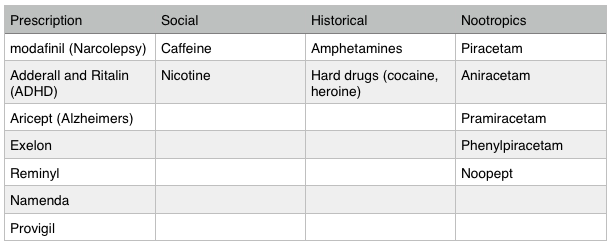Cognitive enhancing chemical technology in the new world of work.
 When Lance Armstrong was bust for using performance enhancing drugs through most of his career one of his defences was that it was part of the racing culture of the time and many other riders were doing it too. In order to be competitive, he believed that he needed to take the drugs. There were, however, riders who raced clean through that period and their anger at this response was to the fact that they lost professional earnings as the result of finishing lower down the field to drug-enhanced winners.
When Lance Armstrong was bust for using performance enhancing drugs through most of his career one of his defences was that it was part of the racing culture of the time and many other riders were doing it too. In order to be competitive, he believed that he needed to take the drugs. There were, however, riders who raced clean through that period and their anger at this response was to the fact that they lost professional earnings as the result of finishing lower down the field to drug-enhanced winners.
In sport it is easy to have a clearly demarcated line between cheaters and non-cheaters because there are lists of drugs that are banned. In striving to achieve success, sportsmen and women know what they may and may not do, or use, in order to enhance or improve their natural performance ability.
What happens when a performance enhancing drug culture enters the workplace? And, what implications may this have for the future world of work? [bctt tweet=”What happens when a performance enhancing drug culture enters the workplace?”]
In the past few weeks articles have been written about a drug prescribed for narcolepsy called Modafinil describing it as the worlds first truly smart drug. “It enhances attention, improves learning, and boosts “fluid intelligence”—which we use to solve problems and think creatively. And it does all that without the addictive qualities of caffeine”. This so-called off-label usage of the drug has been studied for several years and its benefits recently confirmed in academic periodicals. But, Modafinil is not the only drug with these off-label uses. Drugs used to treat ADHD and Alzheimers have been used for cognitive-enhancement because in healthy individuals they have an enhancing effects rather than just maintenance ones.
7% students on US campuses are using these cognitive performance enhancing drugs to make the way through college. [Tweet this] On some campuses 25% of students are using them. In highly competitive academic environments were getting into the best schools, and best faculties in the schools, means getting the best jobs in the best companies as graduates – it is understandable that these students are using every advantage available to them, including chemical enhancement.
When these young men and women move into the workplace it is rational to believe that they will continue using the elements that enabled them to get there in the first place. This is especially understandable when we realise that in many of the top corporate workplaces the pressure on graduates to perform is exponentially higher then anything they ever experienced when they were students.
All of these factors have given rise to a performance enhancing discipline called nootropics. The list below is a non-comprehensive collection of nootropic types you may start hearing in conversation as these graduates begin to work in the same way as they studied.

Before we get morally engaged at the concept of drugs at work we need to remove the emotion from the equation and to see these chemicals as medical technology advances. Human history is replete with us using technological advances to improve our ability to work and live and learn. The invention of the wheel, writing, printing press, computer, internet, and smartphone have built to the point that we now have a generational demographic defined by the use of performance increasing digital technology (Digital Natives). These drugs and chemicals are at the simplest level just enhancements along another continuum. Consider the second column in the table above listing caffeine and nicotine as performance enhancers (we have all said: “just let me have my first cup of coffee, or cigarette, so that I can get going today). The primary difference between them and those in the other column is that we have made them socially acceptable despite the fact that they are probably more addictive then many of the other chemicals listed.
Before we move this drug discussion into the corporate workplace is also useful to consider their application in other environments. The US military is experimenting with Modafinil, and has made it illegal for soldiers to refuse an order where they are instructed to use chemicals to improve alertness or their ability to execute a military function. In World War II pilots and soldiers were regularly given amphetamines to stay awake through long missions.
If you were going into an operation and you knew that if the surgeon took a cognitive enhancer it would make them less likely to make mistakes and more likely to do a better job, would you not expect, and request, your doctor to use these during your procedure?
Considering the significance that our jobs hold in our lives, and how our ability to perform exceptionally, thereby being positioned for promotion and other benefits, does it not make sense that cognitive enhancement in the corporate workplace is not only to be expected, but should be planned for?
If a HR department knows that giving access to cognitive enhancing drugs during training or development courses means a greater return on investment for their training should we not anticipate this being required for the most significant corporate human capital investments?
Consider two people in the running for a promotion. If cognitive enhancement improves the ability to achieve that goal would one individual use it for a leg up on the other? And is it their fault for improving their performance to get the job, or is it the fault of the one who didn’t for not being driven enough?
At the moment some organisations do random drug tests looking for illegal drugs is like marijuana and cocaine. Will tests for cognitive enhancing drugs now be taken in future? And, will the desired results be positive for use of these drugs rather then negative for their non-use?
If we consider the financial cost of access to these drugs are we creating a new class-based distinction where poor people, who have no access to these cognitive-enhancers through off-label prescriptions, are unintentionally excluded from the best programs or jobs. Those poor people who do have high capabilities may loose out to richer people of average natural ability who are chemically enhanced performers.
In the new world of work many of the changes we experience and have to deal with are results of changes in technology. Changes in digital technology, mechanical technology, and other innovations are embraced and often desired in our organisations. As a new generation of graduates begin entering the workplace, who are used to using chemical technology for off-label cognitive enhancement ,we need to begin to factor these changes into our views of the future world of work too.
As with all innovations and technological advancements railing against the change may not achieve anything, as the horse has already bolted. Our role as leaders and the managers in this future world of work requires that today we engage not with the technology but with the ethics of the their use. We need to ask ourselves what we will accept, and what we will not. Then we need to understand, and accept, that in some cases our answers to these questions may put us at a technological disadvantage as we move into the future world of work.
Further reading on this topic:
http://qz.com/485020/the-worlds-first-true-smart-drug-enhances-cognition-and-is-deemed-safe-by-health-experts/
http://repository.upenn.edu/cgi/viewcontent.cgi?article=1039&context=neuroethics_pubs
http://www.druginfo.adf.org.au/drug-facts/cognitive-enhancers-smart-drugs
http://www.ncbi.nlm.nih.gov/pmc/articles/PMC2690227/#b35
http://fusion.net/story/58131/i-tried-silicon-valleys-favorite-brain-enhancing-drugs/
http://nootriment.com/cognitive-enhancers/
http://www.theguardian.com/lifeandstyle/2013/may/03/brain-enhancing-drugs-mj-hyland
http://www.newyorker.com/magazine/2009/04/27/brain-gain


leaving emotion aside we are talking here about medical technological advancement of human congitive function. Whilst it is easy to understand anyone in a competitive environment taking enhancements to be the best maybe we should ask some questions first, like 1. Is progress always beneficial? 2 Is human kind able to adapt to this new technology socially and economically? 3 From a big picture perspective is increasing competition (versus collaboration) at the individual level healthy in the long run.
This is way bigger then people performing better this is the ultimate have and have nots technology and I do not think that the human race is ready for a greater divide, infact it needs greater unity, which may mean we slow down a little to get further and survive better
leaving emotion aside we are talking here about medical technological advancement of human congitive function. Whilst it is easy to understand anyone in a competitive environment taking enhancements to be the best maybe we should ask some questions first, like 1. Is progress always beneficial? 2 Is human kind able to adapt to this new technology socially and economically? 3 From a big picture perspective is increasing competition (versus collaboration) at the individual level healthy in the long run.
This is way bigger then people performing better this is the ultimate have and have nots technology and I do not think that the human race is ready for a greater divide, infact it needs greater unity, which may mean we slow down a little to get further and survive better
Very captivating article. I’m not willing to take powerful prescription drugs due to their addictive nature. But I am in favor of taking natural substances that have been used for thousands of years.
Very captivating article. I’m not willing to take powerful prescription drugs due to their addictive nature. But I am in favor of taking natural substances that have been used for thousands of years.